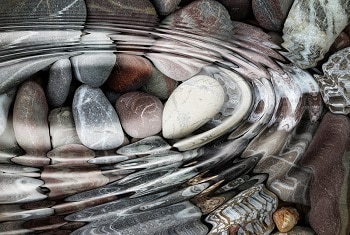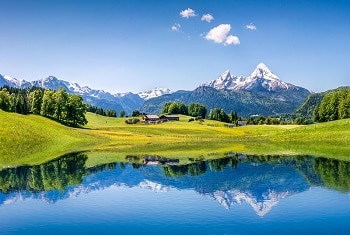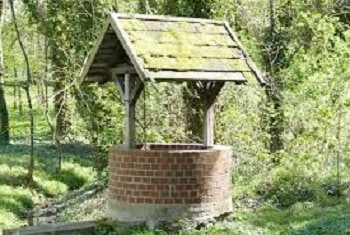So you’re looking at buying a beautiful house in the country, it has a white picket fence, a big lawn and well water. Your last house was in the city, and you have never had well water before. A few of your friends have water softeners, but do you need one?
Water from a well is not always hard, but it is often hard because of the water dissolving hard minerals as it travels through the earth. If water does not come into contact with hard minerals in the ground, water from a well will be soft.
Water can turn around corners and go over and under deposits in the earth, and when it is doing this, it can pick up anything that it makes contact with. This is why water from one well may be exactly the same, or very different from a nearby well. It’s all a matter of chance.
How does water become hard?

Certain minerals in the earth can get dissolved into water as it makes contact with them. When minerals get dissolved into water, the water changes, and some minerals will make water hard.
Some of these minerals are considered to be soft minerals and do not affect the way we use water on a daily basis. Other minerals like calcium and magnesium are referred to as being hard, and they inhibit the effectiveness of soap that we use for cleaning.
If your well water makes contact with deposits of hard minerals, it will dissolve them and therefore cause the water to be hard.
Not all water flowing through the earth will come into contact with hard mineral deposits, so not all water that comes up from a well will be considered to be hard.
Is well water normally harder on top of a hill?

Depending on the composition of the ground, a water source that is higher up a hill or mountain may have a much lower level of hardness than water found farther down the hill.
This is because the water may not travel far enough through the ground to make contact with many hard mineral deposits.
But in some cases, the opposite may be true. If the earth shifted at some point in time to create the hill, hard mineral deposits could have been pushed up to create a very large deposit of hard minerals.
This could make the water towards the top of the hill as hard, if not harder than the water at the bottom of the hill.
Since water sources are more scarce as you go up a hill or mountain, a well will often have to be very deep. This can mean that the water entering the well has traveled a long distance and therefore it may have dissolved many hard minerals in its path.
More shallow wells at higher elevations may have less hard minerals in them, but may not provide as much water, or the water supply may not be available year-round.
Will my well water be hard, just because it is at the bottom of a valley?
Being at the bottom of a valley or at the base of a hill does not mean that the water will be hard. If the water has traveled down from the hill as surface water in a stream or creek, the water may stay quite soft.
But if the water has made its way to the base of the hill by traveling through the earth, it may have become hard as it dissolved hard minerals on its way down.
Does the depth of a Well affect how hard the water is?

A deep well does not mean hard water, it all depends on the composition of the earth at which the water traveled before getting to the well.
In some cases, a shallow well will have less chance of producing hard water simply because the water has not gotten down far enough to reach the hard minerals that are present in the earth in that location.
But generally, the farther down that a well goes, the more likely it is that the water that will come from it will have hard minerals dissolved in it.
Deeper wells are also more likely to reach water that may have sulfur or other gasses in it such as methane. Drilling a well deeper may increase the amount of water available, but in going down deeper, there is a greater chance of having undesirable water issues.
Does well water hardness change over time?
Generally, water hardness does not change significantly over time, but changes in your water supply can affect its hardness and other characteristics.
Nearby construction or other changes in demand on your water source can alter how much hardness is in your water because of your water source drawing additional water from new sources, or the water flow being re-routed.
Even changes in weather can bring a change to the hardness of water, but this is often only a small change, and usually temporary.
Can well water be naturally soft?
Yes, it can! In some regions where hard minerals like calcium and magnesium are less common, well water may not come into contact with these hard minerals and therefore the water produced from a well can be completely soft.
This does not mean that the water will be free of other contaminants like iron, manganese, or even sulfur. These substances do not make water hard, but they do cause staining, odors, and unpleasant tastes in the water.
Also, high levels of salts in the water can cause a salty taste in the water, but this can be remedied with the use of a reverse osmosis drinking water system.
Does hard well water taste different than soft well water?

Water hardness is often due to calcium in the water. Calcium will add a smooth, milky type of taste to water when enough of it is present.
Since, more often than not, water from a well will be hard, it is likely that the water will have a milky taste from the calcium in it.
Many other substances can affect how well water will feel, taste and even smell!
Iron and other metals can get dissolved into water, giving the water a metallic taste, an odd odor, and can sometimes be misconstrued as being hard water.
Acidic water can make your skin feel dry, and it can corrode your metal plumbing which can leave your water smelling and tasting like metal.
Other particles in water like fine sediment or clay can give the water a rough and hard type feeling, even though the water is considered to be soft.
How can I test if my well water is hard?
Testing for hardness in water is very easy.
To get a general idea of the hardness of your water, you can use a very simple to use hardness test strip. Simply run your cold water for a few seconds, and then put the end of the test strip under the water stream for just a second.
Take the test strip away from the water stream and give it a quick shake to remove any excess water. Wait 10 seconds, and compare the color of the strip with the color chart that came with the test to determine the approximate hardness.
If you would like to know your waters’ exact hardness, you can get a water hardness test kit that will give you the exact amount of hardness in your water.


I enjoyed the summary. Just a comment on your section ‘how does water become hard,’ you may have meant to reference magnesium instead of manganese.
Cheers
Hello Julian and thank you for catching that, it has been corrected.
Paul